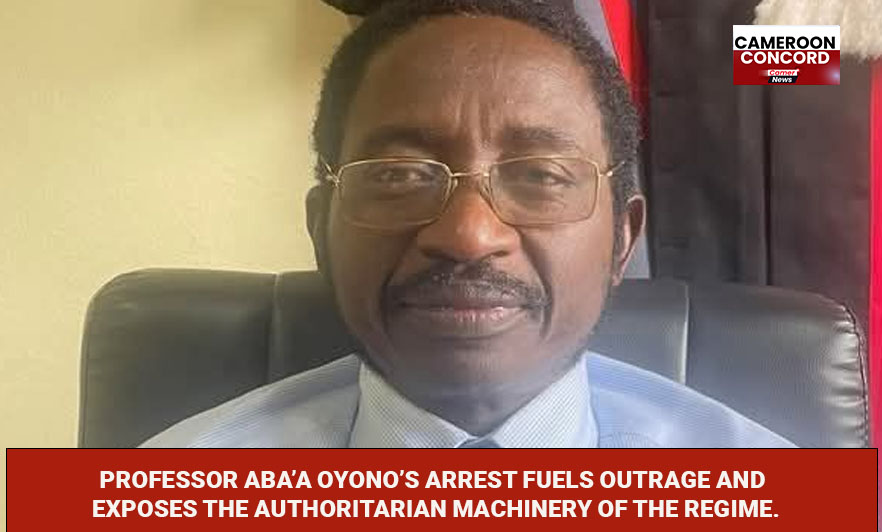- Details
- Politics
Cameroon 2025 — The Arrest of Professor Aba’a Oyono: When the State Turns Against Its Own Conscience
[YAOUNDÉ, Oct 25 — Cameroon Concord Political Desk]
Cameroon’s deepening post-election crisis took a darker turn today with the brutal arrest of Professor Jean-Calvin Aba’a Oyono, a prominent public law scholar at the University of Yaoundé II and special advisor to opposition leader Mamadou Mota.

Witnesses say security forces stormed his residence, forcibly removing him in front of his family. His current location remains unknown. Reports suggest he was taken by agents of the DGRE (General Directorate for External Research) — a unit increasingly used by the regime to silence dissenting voices.
His “crime,” according to political observers, appears to be his public support for Issa Tchiroma Bakary, the candidate who declared victory in the disputed October 12 presidential election.
“Professor Aba’a was not arrested by the law — he was kidnapped by the regime’s muscle,” one opposition lawyer told Cameroon Concord. “This is not about justice; it is about vengeance.”
A Scholar Targeted for His Ideas
Professor Aba’a Oyono, an accomplished academic and constitutional expert, is widely respected across political divides. His arrest has sent shockwaves through the academic community and further illustrated the collapse of basic civil protections under the Biya regime.
“When the bearer of knowledge is treated like a criminal, the State has declared war on intellect and law itself,” said a former colleague at the university.
This incident adds to a growing list of abductions and detentions targeting opposition figures, party officials, and activists in recent days — a campaign human rights monitors describe as “state-engineered terror.”
A System of Fear, Exposed
The arrest underscores what many describe as the true nature of the system: a government that relies on fear to maintain its grip. Analysts note that since election day, the regime has expanded its campaign of intimidation — cutting internet access, arresting journalists, and labeling protesters “terrorists.”
“The only logic that remains,” one legal observer remarked, “is the logic of force — the rule of the gun replacing the rule of law.”
Cameroon Concord’s investigations confirm that Professor Aba’a’s detention follows a pattern identical to previous high-profile cases — including those of Anicet Ekane, Djeukam Tchameni, and Florence Titcho, all opposition figures detained under dubious pretenses in the past 48 hours.
An Urgent Appeal for Humanity and Justice
From exile and from within the country, opposition voices are urging the international community to take concrete action, not merely issue statements.
The collective of Tchiroma’s lawyers warned earlier that any violations committed in the ongoing crisis would be prosecuted before international courts, naming security commanders and political officials directly responsible.
“If the world keeps silent,” reads one statement from the FSNC legal team, “silence will become complicity.”
Within Cameroon, the calls are equally strong:
“The police state wins only when the citizen kneels,” one civil society leader told Cameroon Concord. “We are standing.”
A Nation on Edge
The arrest of Professor Aba’a Oyono — a scholar, a citizen, and a conscience of the republic — has become a symbol of defiance for those resisting repression. His supporters insist that his freedom, and that of every detained activist, will be the line in the sand for Cameroon’s democratic future.
“Liberty is not negotiable,” Tchiroma wrote in response. “Professor Aba’a Oyono must be released immediately and unconditionally. Let the order of law crush the order of force.”
As the regime continues to escalate its tactics, the message from the opposition grows sharper: the dictatorship’s mask has fallen — and history is watching.
- Details
- News Team
- Hits: 181
